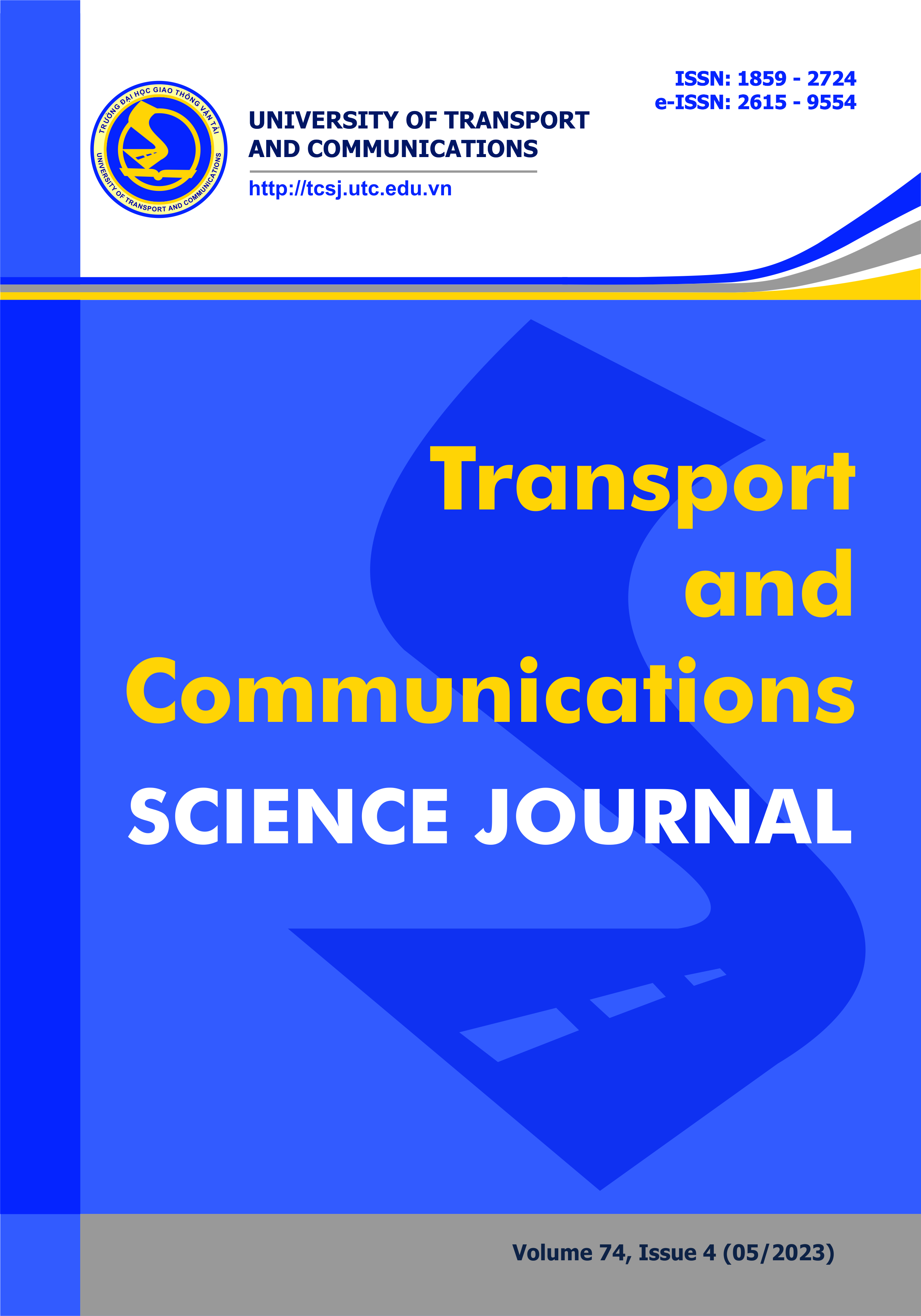A knowledge-based decision support system for incident traffic congestion management
Email:
trinhdinhtoan@tlu.edu.vn
Từ khóa:
congestion management, decision support system, knowledge-based, multi-stage fuzzy logic controller, fuzzy rule
Tóm tắt
A Knowledge-based Decision Support System (KB-DSS) based on a multi-stage Fuzzy Logic Controller (MS-FLC) is developed for traffic congestion management on expressways. The MS-FLC receives real-time traffic and incident data to analyse and anticipate the traffic conditions, to recommend alternative control measures in the form of natural languages for the human operator to select control decisions, and to calculate control settings to manage traffic congestion. In a case study, the KB-DSS is evaluated on a simulated network in comparison to ALINEA\Q, a popular ramp control method, across various traffic and incident situations. The results showed that: (i) the KB-DSS provides a systematic procedure in deriving control actions and a good capability to deliver linguistic expressions; (ii) the KB-DSS outperforms ALINEA\Q with respect to global objectives across many scenarios, attains significant improvements of mainline travel conditions and substantial reductions of ramp queues. These advantages make the KB-DSS a robust tool for traffic control for incident congestion management on expressways.Tài liệu tham khảo
[1]. E. Smaragdis, M. Papageorgiou, A series of new local ramp metering strategies, TRB 82nd Annual Meeting (2003), Washington, D.C.
[2]. J. Ma, B.L. Smith, X. Zhou, Personalized real-time traffic information provision: Agent-based optimization model and solution framework. Transportation Research Part C: Emerging Technologies, 64 (2016) 164-182. https://doi.org/10.1016/j.trc.2015.03.004
[3]. X. Luan, Y. Wang, B.D. Schutter, L. Meng, G. Lodewijks, F. Corman, Integration of real-time traffic management and train control for rail networks - Part 1: Optimization problems and solution approaches, Transportation Research Part B: Methodological, 115 (2018) 41-71. https://doi.org/10.1016/j.trb.2018.06.006
[4]. M. Papageorgiou, H. Hadj Salem, J.M. Blosseville, Alinea: A local feedback control law for on-ramp metering, Transportation Research Record, 1320 (1991) 58-64.
[5]. H. Hashemi, K. Abdelghany, End‐to‐end deep learning methodology for real‐time traffic network management, Computer‐Aided Civil and Infrastructure Engineering, 33 (2018) 849-863. https://doi.org/10.1111/mice.12376
[6]. M.D. Simoni, C.G. Claudel, A fast simulation algorithm for multiple moving bottlenecks and applications in urban freight traffic management, Transportation Research Part B: Methodological, 104 (2017) 238-255. https://doi.org/10.1016/j.trb.2017.06.010
[7]. X. Wang, Z. Ning, X. Hu, L. Wang, B. Hu, J. Cheng, V.C Leung, Optimizing content dissemination for real-time traffic management in large-scale internet of vehicle systems, IEEE Transactions on Vehicular Technology, 68 (2018) 1093-1105. https://doi.org/10.1109/TVT.2018.2886010
[8]. T.D. Toan, Development of a fuzzy knowledge-based system for local traffic control for incident management, PhD Thesis, School of Civil & Environmental Engineering, Nanyang Technological University (2008).
[9]. M. Beynon, S. Rasmequan, S. Russ, A new paradigm for computer-based decision support, Decision Support Systems, 33 (2002) 127– 142. https://doi.org/10.1016/S0167-9236(01)00140-3
[10]. D.J. Power, Decision Support Systems: Concepts and Resources for Managers, Faculty Book Gallery 67, University of Northern Iowa, 2002. https://scholarworks.uni.edu/facbook/67
[11]. C.W. Holsapple, Knowledge management support of decision making (editorial), Decision Support Systems, 31 (2001) 1–3.
[12]. J.F. Courtney, Decision making and knowledge management in inquiring organizations: toward a new decision-making paradigm for DSS, Decision Support Systems, 31 (2001) 17–38.
[13]. M. Won, H. Kim, G.L. Chang, Knowledge-based system for estimating incident clearance duration for Maryland I-95, Transportation Research Record, 2672 (2018) 61-72. https://doi.org/10.1177/0361198118792119
[14]. X. Lu, N. Zhang, C. Tian, B. Yu, Z. Duan, A knowledge-based temporal planning approach for urban traffic control, IEEE Transactions on Intelligent Transportation Systems, 22 (2021) 1907-1918. https://doi.org/10.1109/TITS.2020.3041228
[15]. A.A. Memon, M. Meng, Y.D. Wong, S.H. Lam, Rule-based mode choice model: INSIM expert system, Journal of Transportation Engineering, 141 (2015) 04014088. https://doi.org/10.1061/(ASCE)TE.1943-5436.0000753
[16]. A.A. Memon, M. Meng, Y.D. Wong, S.H. Lam, Calibration of a rule-based intelligent network simulation model, Journal of Modern Transportation, 24 (2016) 48-61. https://doi.org/0.1007/s40534-015-0091-1
[17]. M. Yan, M. Li, H. He, J. Peng, C. Sun, Rule-based energy management for dual-source electric buses extracted by wavelet transform, Journal of Cleaner Production, 189 (2018), 116-127. https://doi.org/10.1016/j.jclepro.2018.04.054
[18]. D.N. Utama, S. Arrahmani, I. Wirahmadayanti, A. Ayuningtias, Decision support model based on fuzzy-logic conception in determining region - “ojek online” transporter appropriateness, International Journal of Emerging Trends in Engineering Research, 8 (2020). https://lc.binus.ac.id/publication/82AC90EF-7DB4-41BA-9DB9-E30DC868C7D0
[19]. V. Srinivas, S. Sasmal, R. Karusala, Fuzzy based decision support system for condition assessment and rating of bridges, J. Inst. Eng. India Ser. A, (2016). https://doi.org/10.1007/s40030-016-0160-4
[20]. D. Kumara, J. Singh, O.P. Singh, Seema, A fuzzy logic based decision support system for evaluation of suppliers in supply chain management practices, Mathematical and Computer Modelling (2013). http://dx.doi.org/10.1016/j.mcm.2013.07.003
[21]. T.D. Toan, Y.D. Wong, Fuzzy logic-based methodology for quantification of traffic congestion, Physica A: Statistical Mechanics and its Applications, 570 (2021) 125784. https://doi.org/10.1016/j.physa.2021.125784
[22]. Y.E. Hawas, M. Sherif, M.D. Alam, Optimized multistage fuzzy-based model for incident detection and management on urban streets, Fuzzy Sets and Systems, 381 (2020) 78-104. https://doi.org/10.1016/j.fss.2019.06.003
[23]. E.C. Hatri, J. Boumhidi, Fuzzy deep learning based urban traffic incident detection, Cognitive Systems Research, 50 (2018) 206-213. https://doi.org/10.1109/ISACV.2017.8054903
[24]. T.D. Toan,V.H. Truong, Support vector machine for short-term traffic flow prediction and improvement of its model training using nearest neighbor approach, Transportation Research Record, 2675 (2021) 362–373. https://doi.org/10.1177/0361198120980432
[25]. T.D. Toan, A fuzzy-based methodology for anticipating trend of incident traffic congestion on expressways, Transport and Communications Science Journal, 73 (2022) 357-372.
https://doi.org/10.47869/tcsj.73.4.2[26]. T.D. Toan, S.H. Lam, Y.D. Wong, M. Meng, Development and validation of a driving simulator for traffic control using field data, Physica A, 596 (2022) 127201. https://doi.org/10.1016/j.physa.2022.127201
[2]. J. Ma, B.L. Smith, X. Zhou, Personalized real-time traffic information provision: Agent-based optimization model and solution framework. Transportation Research Part C: Emerging Technologies, 64 (2016) 164-182. https://doi.org/10.1016/j.trc.2015.03.004
[3]. X. Luan, Y. Wang, B.D. Schutter, L. Meng, G. Lodewijks, F. Corman, Integration of real-time traffic management and train control for rail networks - Part 1: Optimization problems and solution approaches, Transportation Research Part B: Methodological, 115 (2018) 41-71. https://doi.org/10.1016/j.trb.2018.06.006
[4]. M. Papageorgiou, H. Hadj Salem, J.M. Blosseville, Alinea: A local feedback control law for on-ramp metering, Transportation Research Record, 1320 (1991) 58-64.
[5]. H. Hashemi, K. Abdelghany, End‐to‐end deep learning methodology for real‐time traffic network management, Computer‐Aided Civil and Infrastructure Engineering, 33 (2018) 849-863. https://doi.org/10.1111/mice.12376
[6]. M.D. Simoni, C.G. Claudel, A fast simulation algorithm for multiple moving bottlenecks and applications in urban freight traffic management, Transportation Research Part B: Methodological, 104 (2017) 238-255. https://doi.org/10.1016/j.trb.2017.06.010
[7]. X. Wang, Z. Ning, X. Hu, L. Wang, B. Hu, J. Cheng, V.C Leung, Optimizing content dissemination for real-time traffic management in large-scale internet of vehicle systems, IEEE Transactions on Vehicular Technology, 68 (2018) 1093-1105. https://doi.org/10.1109/TVT.2018.2886010
[8]. T.D. Toan, Development of a fuzzy knowledge-based system for local traffic control for incident management, PhD Thesis, School of Civil & Environmental Engineering, Nanyang Technological University (2008).
[9]. M. Beynon, S. Rasmequan, S. Russ, A new paradigm for computer-based decision support, Decision Support Systems, 33 (2002) 127– 142. https://doi.org/10.1016/S0167-9236(01)00140-3
[10]. D.J. Power, Decision Support Systems: Concepts and Resources for Managers, Faculty Book Gallery 67, University of Northern Iowa, 2002. https://scholarworks.uni.edu/facbook/67
[11]. C.W. Holsapple, Knowledge management support of decision making (editorial), Decision Support Systems, 31 (2001) 1–3.
[12]. J.F. Courtney, Decision making and knowledge management in inquiring organizations: toward a new decision-making paradigm for DSS, Decision Support Systems, 31 (2001) 17–38.
[13]. M. Won, H. Kim, G.L. Chang, Knowledge-based system for estimating incident clearance duration for Maryland I-95, Transportation Research Record, 2672 (2018) 61-72. https://doi.org/10.1177/0361198118792119
[14]. X. Lu, N. Zhang, C. Tian, B. Yu, Z. Duan, A knowledge-based temporal planning approach for urban traffic control, IEEE Transactions on Intelligent Transportation Systems, 22 (2021) 1907-1918. https://doi.org/10.1109/TITS.2020.3041228
[15]. A.A. Memon, M. Meng, Y.D. Wong, S.H. Lam, Rule-based mode choice model: INSIM expert system, Journal of Transportation Engineering, 141 (2015) 04014088. https://doi.org/10.1061/(ASCE)TE.1943-5436.0000753
[16]. A.A. Memon, M. Meng, Y.D. Wong, S.H. Lam, Calibration of a rule-based intelligent network simulation model, Journal of Modern Transportation, 24 (2016) 48-61. https://doi.org/0.1007/s40534-015-0091-1
[17]. M. Yan, M. Li, H. He, J. Peng, C. Sun, Rule-based energy management for dual-source electric buses extracted by wavelet transform, Journal of Cleaner Production, 189 (2018), 116-127. https://doi.org/10.1016/j.jclepro.2018.04.054
[18]. D.N. Utama, S. Arrahmani, I. Wirahmadayanti, A. Ayuningtias, Decision support model based on fuzzy-logic conception in determining region - “ojek online” transporter appropriateness, International Journal of Emerging Trends in Engineering Research, 8 (2020). https://lc.binus.ac.id/publication/82AC90EF-7DB4-41BA-9DB9-E30DC868C7D0
[19]. V. Srinivas, S. Sasmal, R. Karusala, Fuzzy based decision support system for condition assessment and rating of bridges, J. Inst. Eng. India Ser. A, (2016). https://doi.org/10.1007/s40030-016-0160-4
[20]. D. Kumara, J. Singh, O.P. Singh, Seema, A fuzzy logic based decision support system for evaluation of suppliers in supply chain management practices, Mathematical and Computer Modelling (2013). http://dx.doi.org/10.1016/j.mcm.2013.07.003
[21]. T.D. Toan, Y.D. Wong, Fuzzy logic-based methodology for quantification of traffic congestion, Physica A: Statistical Mechanics and its Applications, 570 (2021) 125784. https://doi.org/10.1016/j.physa.2021.125784
[22]. Y.E. Hawas, M. Sherif, M.D. Alam, Optimized multistage fuzzy-based model for incident detection and management on urban streets, Fuzzy Sets and Systems, 381 (2020) 78-104. https://doi.org/10.1016/j.fss.2019.06.003
[23]. E.C. Hatri, J. Boumhidi, Fuzzy deep learning based urban traffic incident detection, Cognitive Systems Research, 50 (2018) 206-213. https://doi.org/10.1109/ISACV.2017.8054903
[24]. T.D. Toan,V.H. Truong, Support vector machine for short-term traffic flow prediction and improvement of its model training using nearest neighbor approach, Transportation Research Record, 2675 (2021) 362–373. https://doi.org/10.1177/0361198120980432
[25]. T.D. Toan, A fuzzy-based methodology for anticipating trend of incident traffic congestion on expressways, Transport and Communications Science Journal, 73 (2022) 357-372.
https://doi.org/10.47869/tcsj.73.4.2[26]. T.D. Toan, S.H. Lam, Y.D. Wong, M. Meng, Development and validation of a driving simulator for traffic control using field data, Physica A, 596 (2022) 127201. https://doi.org/10.1016/j.physa.2022.127201
Tải xuống
Chưa có dữ liệu thống kê

Nhận bài
23/03/2023
Nhận bài sửa
15/04/2023
Chấp nhận đăng
14/05/2023
Xuất bản
15/05/2023
Chuyên mục
Công trình khoa học
Kiểu trích dẫn
Trinh Dinh, T. (1684083600). A knowledge-based decision support system for incident traffic congestion management. Tạp Chí Khoa Học Giao Thông Vận Tải, 74(4), 469-483. https://doi.org/10.47869/tcsj.74.4.7
Số lần xem tóm tắt
154
Số lần xem bài báo
206









